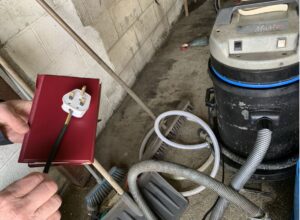Durham car cleaning firm fined for putting workers at risk of electric shock
A County Durham car valeting company has been fined after failing to comply with enforcement notices and putting workers at risk of electrocution.
Health and Safety Executive (HSE) inspectors visited UK Express Valeting Limited’s premises at Abraham Industrial Estate, Bishop Auckland, on 22 March 2022 after a previous visit in March 2020 resulted in enforcement action being taken. This was in relation to unsafe electrical installations and inadequate welfare facilities.
During the inspection in March 2022, several electrical installations were found to be badly maintained and dangerous. A prohibition notice was served by HSE, preventing the use of some of the work equipment which posed a risk of electric shock or electrocution.

HSE also served UK Express Valeting Limited with an improvement notice requiring them to arrange for an electrically competent person to undertake a thorough electrical inspection and test of the fixed electrical installation and associated electrical equipment. The company was required to arrange for any defects identified to be rectified by an electrically competent person.
However, despite four other visits taking place over the following seven months, the company failed to take any action. At one these visits, it was noted that the electrical installations had further deteriorated and two further prohibition notices were served on 26 July 2022, prohibiting the use of a roller shutter garage door control and a vacuum cleaner, as both had exposed live conductors which could cause an electric shock or electrocution.
The HSE investigation found workers at UK Express Valeting Limited were put at significant risk of electric shock or electrocution by the lack of maintenance and failure to put right the faults found with the electrical installations. It was also found that the company did not have valid employers liability compulsory insurance.

UK Express Valeting of Abraham Enterprise Park, Bishop Auckland, Durham, pleaded guilty to breaching the Health and Safety at Work etc. Act 1974 – for failing to comply with an Improvement Notice, Section 33(1)(g) and section 1(1) of the Employers Liability (Compulsory Insurance) Act 1969.
The company was fined £6,000 and ordered to pay £42,389.80 in costs at Peterlee Magistrates’ Court on 16 May 2023.
HSE inspector Clare Maltby said: “Companies are responsible for making certain that their electrical installation and equipment are maintained to prevent danger.
“All car wash and valeting centres must properly maintain their electrical installation and equipment.
“Failure to comply with enforcement notices is a serious offence and HSE will not hesitate to prosecute where companies fail to take the action required.”
HSE inspectors were supported on visits to the company by police officers from North East Regional Organised Crime Unit (NEROCU).
Following the investigation, Kev Benson, the North East GAIN Co-ordinator and Disruption Team Manager for NEROCU, is asking residents to be vigilant.
He said: “This is yet another example of the ongoing work with partners to safeguard workers. No one should have to work in conditions that are unsafe and a risk to themselves and others.
“Where necessary we will support action taken by partners to ensure no laws are being broken and any enforcement notices are complied with.
“I am asking members of the public to continue to remain vigilant and report any concerns or information you have about dangerous working conditions. By doing so you’re helping keep your community safe for everyone.”
Notes to editors
- The Health and Safety Executive (HSE) is Britain’s national regulator for workplace health and safety. We prevent work-related death, injury and ill health through regulatory actions that range from influencing behaviours across whole industry sectors through to targeted interventions on individual businesses. These activities are supported by globally recognised scientific expertise.
- More information about the legislation referred to in this case is available.
- Further details on the latest HSE news releases is available.
- HSE guidance on electrical safety and maintenance, employers’ liability insurance and the provision of welfare facilities is available.


